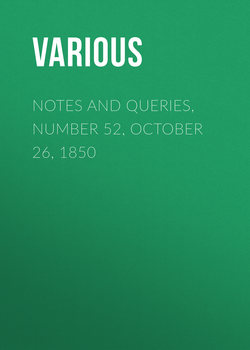Читать книгу Notes and Queries, Number 52, October 26, 1850 - Various - Страница 2
NOTES
SHAKSPEARE'S USE OF THE WORDS "CAPTIOUS" AND "INTENIBLE."
ОглавлениеIn the following passage of All's Well that Ends Well, Act i. Sc. 3., where Helena is confessing to Bertram's mother, the Countess, her love for him, these two words occur in an unusual sense, if not in a sense peculiar to the great poet:—
"I love your son:—
My friends were poor, but honest, so's my love:
Be not offended, for it hurts not him,
That he is lov'd of me: I follow him not
By any token of presumptuous suit;
Nor would I have him till I do deserve him:
Yet never know how that desert may be.
I know I love in vain; strive against hope;
Yet, in this captious and intenible sieve
I still pour in the waters of my love,
And lack not to lose still."
Johnson was perplexed about the word captious; "which (says he) I never found in this sense, yet I cannot tell what to substitute, unless carious for rotten!" Farmer supposed captious to be a contraction of capacious! Steevens believed that captious meant recipient, capable of receiving; which interpretation Malone adopts. Mr. Collier, in his recent edition of Shakspeare, after stating Johnson's and Farmer's suggestions, says, "where is the difficulty? It is true that this sense of captious may not have an exact parallel; but the intention of Shakspeare is very evident: captious means, as Malone says, capable of taking or receiving; and intenible (printed intemible in the first folio, and rightly in the second) incapable of retaining. Two more appropriate epithets could hardly be found, and a simile more happily expressive."
We no doubt all know, by intuition as it were, what Shakspeare meant; but "the great master of English," as Mr. Hickson very justly calls him, would never have used captious, as applied figuratively to a sieve, for capable of taking or receiving.
Intenible, notwithstanding the hypercriticism of Mr. Nares (that "it is incorrectly used by Shakspeare for unable to hold;" and that "it should properly mean not to be held, as we now use untenable") was undoubtedly used in the former sense, and it was most probably so accepted in the poet's time; for in the Glossagraphia Anglicana Nova, 1719, we have "Untenable, that will not or cannot hold or be holden long."
With regard to captious, it is not so much a matter of surprise that none of all these learned commentators should fail in their guesses at the meaning, as that none of them should have remarked that the sense of the Latin captiosus, and of its congeners in Italian and old French, is deceitful, fallacious; and Bacon uses the word for insidious, ensnaring. There can be no doubt that this is the sense in which Shakspeare used it. Helen speaks of her hopeless love for Bertram, and says:
"I know I love in vain, strive against hope; yet in this fallacious and unholding sieve I still pour in the waters of my love, and fail not to lose still."
When we speak of a captious person, do we mean one capable of taking or receiving? Then how much more absurd would it be to take it in that impossible sense, when figuratively applied in the passage before us! Bertram shows himself incapable of receiving Helena's love: he is truly captious in that respect.
In French the word captieux, according to the Academy, is only applied to language, though we may say un homme captieux to signify a man who has the art of deceiving or leading into error by captious language.
It is not impossible that the poet may have had in his mind the fruitless labour imposed upon the Danaïdes as a punishment, for it has been thus moralised:
"These virgins, who in the flower of their age pour water into pierced vessels which they can never fill, what is it but to be always bestowing over love and benefits upon the ungrateful."
S. W. Singer.
Mickleham, Oct. 4. 1850.
